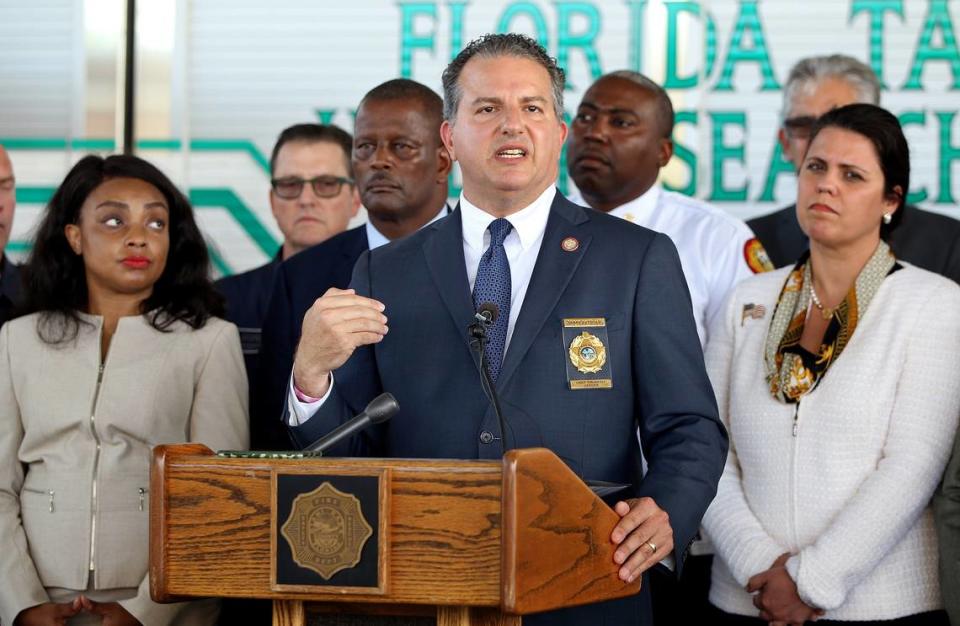Board chairman of Florida program accused of denying aid to disabled children quits
The leader of the governing body of Florida’s birth injury compensation fund resigned Wednesday, part of an exodus of board members that has brought a near-complete overhaul of the board’s governance.
In an email to Florida’s top financial watchdog, Charlie Lydecker, chairman of the Birth-Related Neurological Injury Compensation Association, wrote his departure from the board of directors was prompted by recent legislation that limited the service of board members to six years. Lydecker had served for nearly 13.
“I remain committed to the purpose and mission of NICA, and offer my support [to] you and the incoming board through this transition,” Lydecker wrote to the state’s chief financial officer, Jimmy Patronis. “It has been the honor of a lifetime to serve the children and families of NICA and the state of Florida.”

Lydecker did not respond to requests for comment by phone and email from the Miami Herald.
NICA, as the little-known program is called, was the brainchild of Florida lawmakers who were seeking an answer to obstetricians’ demands that their malpractice insurance premiums be lowered. The 1988 law prohibits parents from suing under certain circumstances when their children are born with devastating brain damage as the result of oxygen deprivation or spinal cord injury.
In return for losing their day in court, parents were promised a lifetime of “medically necessary” and “reasonable” care for their disabled children, and were given a $100,000 upfront payment.
Beginning in April, the Miami Herald and the investigative journalism nonprofit ProPublica published a series of articles documenting how NICA had accumulated nearly $1.5 billion in reserves while parents complained that administrators often denied care arbitrarily, leaving them to struggle to obtain necessary medication, supplies, therapy and equipment — including wheelchairs and breathing machines.
In response to the reporting, the Legislature unanimously passed a sweeping reform bill during the recent session’s waning days, including measures that set aside $10,000 annually for the mental health needs of covered families and $100,000 for families to make their homes accessible for wheelchairs and hydraulic lifts. The $100,000 upfront payment, unchanged since 1988, was increased to $250,000.
Lawmakers also took aim at NICA’s then-five member board, which included two doctors, two insurance industry members and a hospital administrator — all men. The Legislature expanded the panel to seven members and set term limits for the first time since the program’s creation. Three board members, all of whom had served longer than that, resigned soon after.
During its 33 years, NICA’s board had never included a parent of a child enrolled in the program, or an advocate for disabled people.
It will now. The new law requires that a NICA parent and an advocate for children with special needs serve on the board, and precludes a medical or insurance industry insider from holding a seat reserved for a Florida “citizen.” Lydecker, who had chaired the board since 2008 and held the citizen’s slot, is a health insurance executive.

With Lydecker’s departure, Patronis will be responsible for filling five seats on the NICA board in coming weeks. As a result of the resignations in early June, the board was already without a quorum, prompting the cancellation of a board meeting.
One board member, Dr. Samuel Wolfe, an obstetrician who is covered by NICA, has been on the board since 2020, and remains. And last week, Patronis filled a board seat created by the legislation by appointing Jim DeBeaugrine, a former state disability agency head and longtime advocate for people with disabilities. DeBeaugrine also helps care for a family member with significant disabilities.
In an interview with the Herald, DeBeaugrine, who recently led The Arc of Florida advocacy group, said he expected the reconstituted board to re-evaluate the program “from top to bottom.”
“We have an opportunity to go in and make fundamental changes in how the organization interacts with the families it serves.”

